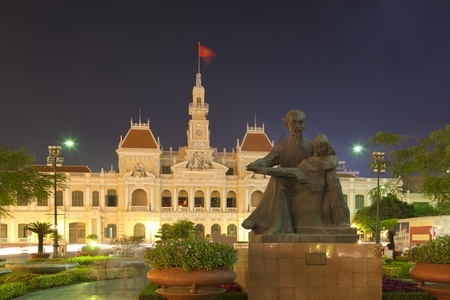19 April, 2017
Vietnam is one of the countries with the highest ratio of public investment to GDP on the world (i.e., 39% annually from 1995). However, Vietnam has not agreed to coverage of their government procurement by the Government Procurement Agreement of the WTO (GPA). Indeed, Vietnam for the first time has undertaken to do so in a recent Free Trade Agreement with the EU (EVFTA).
Currently Chinese companies profit the most from Vietnam’s procurement market. 90% of power, mining, manufacturing, ferrous and chemical projects of state-owned companies in Vietnam are awarded to Chinese contractors. China State Construction Engineering Corp (CSCEC) keeps winning important contracts although it has a poor track record and has even been blacklisted by the World Bank due to bribery charges. With the EVFTA that attractive market would be open to European companies which probably would be welcomed.
How is government procurement addressed under the EVFTA?
The EVFTA on Government Procurement mainly deals with the requirement to treat EU bidders or domestic bidders with EU investment capital and Vietnamese bidders equally when a government buys goods or requests for a service worth over the specified threshold. Vietnam undertakes to timely publish information on tender, allow sufficient time for bidders to prepare for and submit bids, maintain confidentiality of tenders. The EVFTA also requires its Parties assess bids based on fair and objective principles, evaluate and award bids only based on criteria set out in notices and tender documentation, create an effective regime for complaints and settling disputes, etc. These rules require all Parties, especially Vietnam, in the context of China’s bidders predominantly win the bids with cheap offer price but low-quality services, to reform their bidding procedures and protect their own interests by disqualifying tenders with poor performance and low capacity.
What is the covered procurement?
Government procurement of goods or services or any combination thereof that satisfy the following criteria falls within the scope of the EVFTA Government Procurement rules:
| Criteria | EVFTA |
| Monetary values that determine whether procurement by central government is covered under an agreement | 130,000 Special Drawing Rights (SDRs) (US$191,000) after 15 years from the entry into force of the agreement
Initial transitional threshold: 1.5 million SDRs (US$2.23 million) |
| Procurement of construction services by central government entities | Initial threshold: 40 million SDRs (US$58.77 million)
After 15 years, 5 million SDRs (US$7.35 million) |
| Entities covered | 22 central government bodies
42 other entities (including 2 utility-related state-owned enterprises, 2 universities, 2 research institutes and 34 public hospitals under the control of the Ministry of Health
Sub-central government coverage: including Hanoi and Ho Chi Minh |
| Exclusion of preferences for SMEs | Broad exclusion |
| Application of offsets | Based on value of a contract |
Currently the EU investors are expressing great interest in Long Thanh Airport project, whose total investment amount is approximately USD16 billion. This project is located in Dong Nai, 40km East from Ho Chi Minh City. When it is completed in 2025, it will become the biggest airport in Vietnam. The project is now at the feasibility study stage. Its result will be submitted to relevant authorities for approval in Q3 2017. It is expected that in 2019, the investor – Aviation Corporation of Vietnam will select the main constructor for the project. Selection form and requirements are not available at the moment. This is a great opportunity for European investors, considering that the next phase of the project will start when the EVFTA is already in effect.
How to appeal Government tender decision?
EVFTA makes it possible that the EU could sue Vietnam (or vice versa) for its tender decisions according to the dispute settlement by arbitration rules in a separate chapter of the EVFTA. The violating party must take all necessary measures to promptly comply with the arbitral decision. In case of non-compliance, as in the WTO, the EVFTA allows temporary remedies (compensation) at the request of the complaining party.
Enforcement of arbitral awards
In disputes regarding investment (for example, expropriation without compensation, discrimination of investment), an investor is allowed to bring the dispute to the Investment Tribunal for settlement (Investor-to- State dispute settlement mechanism – ISDS). The final arbitral award is binding and enforceable without any question from the local courts regarding its validity. This is an advantage for European investors considering the fact that the percentage of annulled foreign arbitral awards in Vietnam remains relatively high for different reasons. According to report of the Supreme Court of Vietnam, the biggest reason lies in the relevant courts which are responsible for implementing the procedures for recognition and enforcement of foreign arbitration bodies. Specifically, in-charge judges do not fully understand nature of Vietnam’s commitments to New York Convention 1958, wrongly apply Vietnamese proceeding rules and, in some cases, are simply corrupted by the losing parties, often the local defendants.
Different from investment related disputes, disputes over a Government tender decision must be brought to the arbitration panel by a Government against the other Government. It is not clear whether local courts could annul arbitral awards of the arbitration panel regarding a wrongful tender decision. However, it is gradually becoming a less significant issue as over time, the number of rejected enforcement of arbitral wards in Vietnam is substantially on decline. The recognition and enforcement process is also shortened and is getting more straightforward and transparent. This is thank to efforts of the Supreme Court of Vietnam in training courts of lower levels, voices raised by foreign business communities and drastic changes in Vietnam’s proceeding laws recently.
We believe that the procedural and legal changes regarding government procurement will enable EU exporters to reach
markets that were closed before and compete more effectively.
For further information, please contact:
Oliver Massmann, Partner, Duane Morris
omassmann@duanemorris.com

.jpg)





